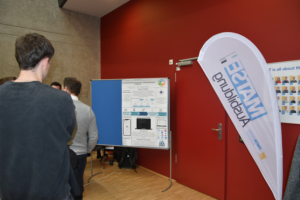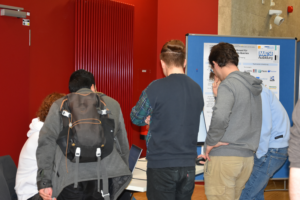
Source: Own Illustration
On February 16, 2024, the IT Center opened its doors again for the Software Technology Fair, which is the highlight of the Software Technology module for the dual students of the Applied Mathematics and Computer Science degree program. The prospective mathematical-technical software developers (MATSE) had the opportunity to proudly present their practical projects.
Diverse Projects, Impressive Innovations
A total of 18 groups of MATSE trainees presented their projects, which covered an impressive range of innovations. From the development of a multi-domain partitioning algorithm for quadrilateral meshing to a collaborative 3D drawing tool for multi-user VR applications, the variety of projects offered a fascinating insight into the world of software development.
The projects were developed in collaboration with renowned companies and higher education institutions. Each project reflected not only the students’ technical skills, but also their ability to tackle complex challenges in the real world. In addition to the IT Center’s MATSEs, many companies also participated, including Amadeus Leisure, Databay, GTS Systems and Consulting, Decadia, INFORM, utilitas, Ericsson and CAE. Various RWTH institutions, such as the IT Center, the Institute of Operations Research and Management, the Institute of Structural Mechanics and Lightweight Construction, the Institute of Technical and Macromolecular Chemistry, the Department of Engineering Hydrology, the Chair of Structural Analysis and Structural Dynamics and the Machine Tool Laboratory were also represented as project sponsors.
The MATSE trainees from the IT Center presented two fascinating projects at the trade fair: a tool for “Viewing consequences” and the “Development of REST APIs and dashboards for parameterized Wikidata queries”.
Software for Calculating and Displaying Sequences in a Graphical User Interface
As part of the project, a user-friendly desktop application was developed that enables mathematical sequences to be calculated and displayed graphically in an intuitive way. The aim was to create an improved visualization of sequences and to support the lecture mode.
The software was designed with a focus on user-friendliness and offers an easy way to enter mathematical formulas and adjust parameters to customize the analysis of the sequences.
In the current development phase, not only have the originally planned requirements been successfully implemented, but additional functions have also been added. These include support for recursive sequences, series and the ability to save and open sequences. Some challenges arose during the development process, particularly when plotting values and entering sequences. However, these were successfully overcome and the application is now in a stable state.
REST APIs and Dashboard for Parameterized Wikidata Queries

Source: Own Illustration
The aim of the project is to develop an informative website for specialist consortia and universities of the National Research Data Infrastructure (NFDI). Vue and Plotly are used in the frontend and a Flask server and Python in the backend. The website allows users to compare universities and graphically display statistical information based on parameterized SPARQL queries to Wikidata. By integrating SPARQL queries, users can set dynamic filters, allowing for customization of queries. The development of this system is a challenge, especially in terms of user interaction to set the parameters without complicating the file format.
Successful Fair and Positive Atmosphere
The Software Engineering Fair provided a final platform for the presentation of the practical projects in which the MATSEs expanded their technical skills and soft skills such as teamwork, self-organization and communication. The positive feedback from the students and the opportunity to exchange ideas with each other contributed to a successful event.
We congratulate the MATSE trainees on their impressive projects and are already looking forward to next year’s challenges. Anyone interested in MATSE training can find more information on our MATSE website.
Responsible for the content of this article is Malak Mostafa.




